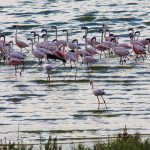Interview of Ekwoge Abwe
Hello Ekwoge. You are the manager of the Cameroonian NGO EBO FOREST RESEARCH PROJECT. Can you introduce yourself and explain the motivations that led you to work in the protection of Nature in Cameroon? What is the main reason for your commitment to this cause?
Thank you PPI for this opportunity to talk about our work and the significance of the biodiversity of the Ebo forest in Cameroon. I am Ekwoge Abwe, a primatologist by training. I began my conservation career in 1998, first as a geographic information system operator and in 2003, I started working as a research assistant on primate surveys under Dr. Bethan Morgan. In August 2005, I observed chimpanzees cracking nuts of Coula edulis in Ebo using stone hammers. This was the first observation of this subsistence tool use behavior outside western chimpanzees in west Africa, and it rekindled my interest in primates and especially great apes. In 2010, I completed an MSc in Primate Conservation at Oxford Brookes University, UK ,and in 2018, I completed my doctoral degree at Drexel University, USA with focus on behavioral diversity in two genetically distinct Nigeria-Cameroon chimpanzee populations in distinct habitats (rainforest and forest-woodland-savanna mosaic). In the course of time, I came to understand the diversity of primate species in Cameroon, but even more important, the threats the different species were facing across their natural habitats in the country. Initial survey results in the Ebo forest for example showed that the diversity of primate species including great apes, other large mammals and plants was very high. In addition, the cultures and livelihoods of more than 40 communities adjacent to the forest were intricately linked with this rich biodiversity. This human-biodiversity matrix has shaped my philosophy of inclusion (especially of grassroots communities) in biodiversity conservation. Today we collaborate with local community groups around the Ebo forest to promote community-led conservation initiatives.
Ebo Forest, where your organization has been focusing its work for about twenty years now, constitutes an important conservation stake in Cameroon: what are the specificities that make this forest area a hotspot for nature conservation in your country? , and more generally in Central Africa?
Rightly, the Ebo forest and it’s rich biodiversity are of global significance. The forest falls with the Gulf of Guinea rainforest, and with the adjacent Makombe and Ndokbou forests constitute the most intact tract of forest in this ecoregion. The forest constitutes ~50% of the Yabassi Key Biodiversity Area and sequesters 35 million tonnes of carbon. In terms of its biodiversity, the forest harbors 11 diurnal species of primates including Nigeria-Cameroon chimpanzees (~20% of the subspecies population lives in Ebo, and it is the only wild population that uses tools to both fish for termites and crack hard-shelled nuts), western gorilla (geographically isolated population whose taxonomic affinity is still unknown), drill, Preuss’s red colobus monkeys; several large mammals including forest elephants. The botanical diversity of the forest in high, and 29 new species to science have been described in the forest since 2005, many of which are endemic to the forest and are endangered. More than 40 villages surround the forest, and their livelihoods, ancestries and cultures are tied to the forest. Despite the rich and unique diversity, as well as the socioeconomic and cultural significance of the forest, there is no legal protection status for the forest. From 2006, the government of Cameroon initiated the process to gazette the forest into a national park. This process was stalled due largely to lack of political will, and in 2020, the government initiated another process, this time around to classify the forest into two Forest Management Units (FMU) for timber exploitation. Following staunch protests from a wide range of stakeholders, the government later suspended the decree that in July 2020 had classified FMU 07: 006 into a logging concession as well as halted the classification process of FMU 07: 005. Aside from these threats related to land use option uncertainties for the forest, hunting and bushmeat trade, illegal logging, and habitat destruction related to subsistence and agro-industrial farming are rife.
A lot of people have heard about Ebo lately because of the pressure on the massif: what happened in early 2020 and where is the situation today?
You are right, Ebo forest became a major focus from February 2020 when the Cameroon Minister of Forestry and Wildlife published two public notices for the classification of the forest into two Forest Management Units (FMU): FMU 07: 005 and FMU 07: 006. The public notices were signed in February 2020 but only made public on the eve the first sensitization meeting in Yabassi on March 9, 2020. Given the rich cultural- and bio-diversity, and global significance of the forest, there was widespread condemnation of the proposed classification of the forest into long term logging concessions. Despite these protests from a wide range of stakeholders including grassroots communities, researchers and conservationists, the government of Cameroon went ahead to sign a decree creating FMU 07: 006 in July 2020. The persistence and unwavering nature of protests urged the government to suspend the decree creating FMU 07: 006 three weeks after classification and to halt the process of classification of FMU 07: 005. This could be seen as a conservation victory for the Ebo forest and biodiversity protection in Cameroon as a whole. However, the threats persist, as there is no formal land use option for the forest till date.
In April 2020, a group of conservationists and researchers who had or are working in Ebo forest wrote a letter to the Prime Minister of Cameroon urging the government to suspend plans to classify the forest into logging concessions, and to rather engage all stakeholders into an inclusive and transparent land use planning process to decide the best and most sustainable land use options that would cater for the socioeconomic and cultural wellbeing of local communities, as well as preserve the rich biodiversity of the area for posterity. This land use planning proposal has been supported by a wide range of stakeholders in Cameroon and abroad including various diplomatic services and donor partners in Cameroon. Consultations between development and conservation partners and the government of Cameroon, especially the Ministry of Economy, Planning and Regional Development are underway to initiate the local land use planning process in Ebo.
If you had to give advice to a young professional setting up an NGO in an African country, what would it be?
My simple advice would be for any aspiring young professionals to be passionate about their work, clearly define their interests and goals, and to be persistent. Success depends so much on team work and collaboration with the range of stakeholders any NGO works with. So building the capacity of your team and regular communication with key stakeholders are necessary prerequisites for NGO success.



